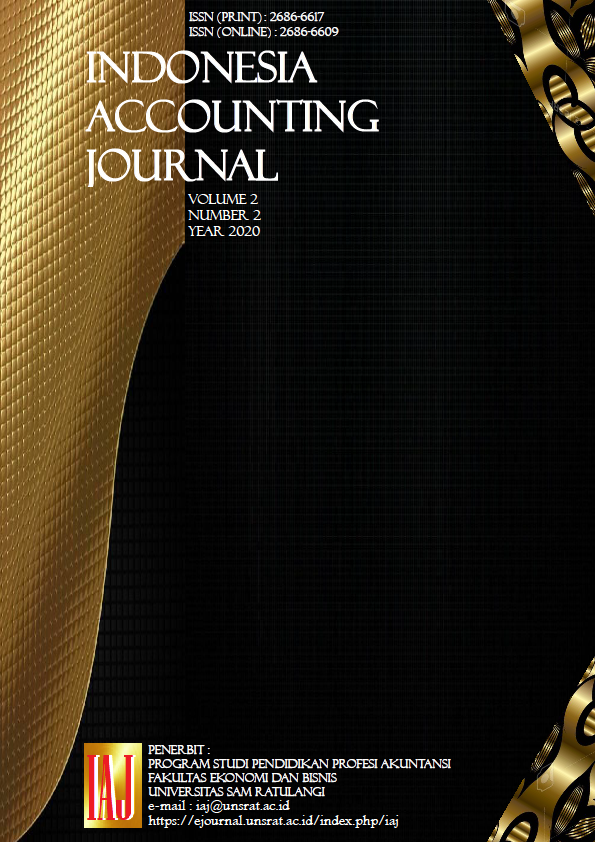Analisis retribusi pelabuhan dalam upaya peningkatan Pendapatan Asli Daerah (PAD) di Kota Sorong
DOI:
https://doi.org/10.32400/iaj.27785Keywords:
regional original revenue, port levies, efforts to increaseAbstract
Regional original income is the original source of regional revenue extracted in the region which is used for the basic capital of the regional government in financing development and regional efforts to minimize the dependency of funds from the central government. Regional governments are expected to be more able to explore financial resources to the maximum, but of course in the corridor of the applicable legislation in particular to meet the needs of government funding and development in the region through Regional Original Revenue. One of them is levies from the port levies or by the name of the port service levies levied as fees for payment, anchoring services / mooring services, aviation services and scouting, dock services. This study aims to determine and analyze the increase in sea port levies to the Regional Original Revenue (PAD) Sorong City. The analytical method used in this thesis research is a descriptive method that aims at each data collected collected analyzed and drawn a conclusion and the type of research used is descriptive qualitative. Based on the results of the port levy analysis, it can be seen that during the 2011-2015 observation year, the realization of port charges on the PAD had increased quite well.
References
Bastian, I. (2012). Akuntansi sektor publik, Edisi 3. Jakarta: Penerbit Erlangga.
Darwin. (2010). Pajak Daerah dan retribusi daerah. Jakarta: Penerbit Mitra Wacana Media.
Go, E. R., Sondakh, J., & Wokas, H. (2013). Analisis penerimaan retribusi parkir Kota Manado tahun 2008-2012. Going Concern : Jurnal Riset Akuntansi, 8(3), 26-36. https://doi.org/10.32400/gc.8.3.25098.2013.
Handoko, A. T., (2012). Analisis perkembangan retribusi pasar daerah sebagai sumber pembiayaan otonomi daerah di kabupaten pemalang tahun 2007-2011. Economics Development Analysis Journal, 1(2), 1-7. https://journal.unnes.ac.id/sju/index.php/edaj/article/view/470.
Halim, A. (2012). Akuntansi keuangan daerah, Edisi 4. Jakarta: Penerbit Salemba Empat.
Kambu, S. S., Rotinsulu, D. Ch., & Tumangkeng, S. Y. I. (2015 ). Kontribusi pajak dan retribusi daerah terhadap pendapatan asli daerah kabupaten Sorong. Jurnal Berkala Ilmiah Efisiensi, 15(3), 1-14. https://ejournal.unsrat.ac.id/index.php/jbie/article/view/8594.8167.
Peraturan Pemerintah Republik Indonesia No. 71 tahun 2010 tentang standar akuntansi Pemerintahan (SAP).
Peraturan Menteri Perhubungan Republik Indonesia No. 72 Tahun 2017 tentang Jenis, Struktur, Golongan Dan Mekanisme Penetapan Tarif Jasa Kepelabuhanan.
Peraturan Menteri Dalam Negeri No. 37 Tahun 2014 tentang Pedoman Penyusunan Anggaran Pendapatan dan Belanja Daerah (APBD).
Peraturan Daerah Kota Sorong No. 20 tahun 2013 tentang Penyertaan Modal Daerah.
Peraturan Pemerintah No. 31 Tahun 2016 tentang Kawasan Ekonomi Khusus Sorong.
Siahaan, M. P. (2010). Pajak daerah & retribusi daerah, berdasarkan Undang-Undang No.28 Tahun 2009 tentang pajak daerah dan retribusi daerah, Edisi Revisi 2010. Jakarta: PT Raja Grafindo Persada.
Toduho, D. A. M., Saerang, D. P. E., & Elim, I. (2012). Penerimaan retribusi pasar dalam upaya meningkatkan pendapatan asli daerah Kota Tidore Kepulauan. Jurnal EMBA: Jurnal Riset Ekonomi, Manajemen, Bisnis dan Akuntansi, 2(2), 1090-1103. https://ejournal.unsrat.ac.id/index.php/emba/article/view/4501.
Undang-undang No. 28 tahun 2009 tentang Pajak Daerah Dan Retribusi Daerah.
Undang-undang No. 23 tahun 2014 tentang Pemerintah Daerah.
Weygandt. J. J., Kimmel. P. D., & Kieso. D. E., (2011). Financial accounting, IFRS Edition. United State: John Wiley & Sons, Inc.
Downloads
Additional Files
Published
Issue
Section
License
The articles published in Indonesia Accounting Journal are licensed under Creative Commons Attribution 4.0 International License with authors as copyright holders.
Â

This work is licensed under a Creative Commons Attribution 4.0 International License.
Â
Under this license then authors free to:
- Share — copy and redistribute the material in any medium or format.
- Adapt — remix, transform, and build upon the material for any purpose, even commercially.
Under the following terms :
- Attribution — You must give appropriate credit, provide a link to the license, and indicate if changes were made. You may do so in any reasonable manner, but not in any way that suggests the licensor endorses you or your use.
- No additional restrictions — You may not apply legal terms or technological measures that legally restrict others from doing anything the license permits.
Notices:
- You do not have to comply with the license for elements of the material in the public domain or where your use is permitted by an applicable exception or limitation.
- No warranties are given. The license may not give you all of the permissions necessary for your intended use. For example, other rights such as publicity, privacy, or moral rights may limit how you use the material.


